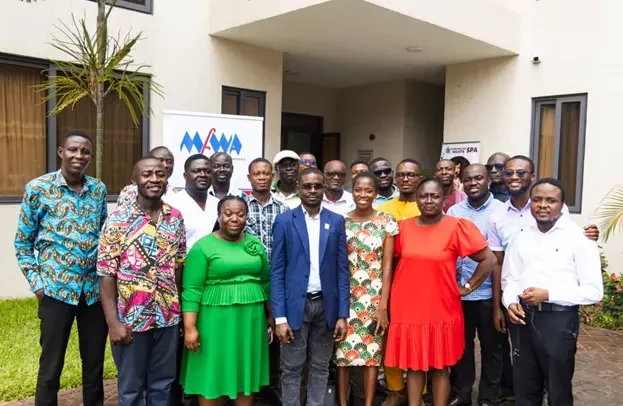The participants in a group photograph
The Ashanti Regional Head of the Economic and Organised Crime Office (EOCO), Edward Cudjoe, has called on journalists to play a more proactive role in the fight against Illicit Financial Flows (IFFs), which continue to deprive Ghana of millions of dollars annually.
Speaking at a two-day training workshop on Illicit Financial Flows and Progressive Taxation for journalists in Kumasi, Mr. Cudjoe underscored the critical role the media plays in informing the public and shaping national discourse on economic crimes. The workshop brought together media professionals from across the region and aimed to equip them with the knowledge and tools to effectively identify and report on illicit financial activities.
The event was organised by the Media Foundation for West Africa (MFWA) with support from Oxfam Ghana and the Ministry of Foreign Affairs of Denmark, as part of efforts to strengthen journalists’ capacity to report on IFFs and progressive taxation policies—key elements in Ghana’s domestic revenue mobilisation strategy.
“Illicit financial flows are getting bigger, and Ghana is not exempt,” Mr. Cudjoe warned. “These flows drain the country of valuable resources—funds that could otherwise be used to provide education, healthcare, and infrastructure for our people.”
He explained that IFFs occur through various illegal or unethical means, including tax evasion, money laundering, corruption, and the exploitation of loopholes in the tax system. Frequently, these funds are moved through complex mechanisms involving tax havens, shell companies, and informal systems, making them difficult to trace and prosecute.
“It is not a failure of our laws,” he said. “Rather, it’s a combination of weak enforcement, abuse of legal tax avoidance mechanisms, and in some cases, outright complicity. When money is moved illegally out of the country, it’s not just a financial issue—it becomes a national security threat.”
Mr. Cudjoe further noted that illicit funds can be used to fuel armed conflict, terrorism, or other destabilising activities. He cautioned that in some instances, such funds are laundered and returned to the country under the guise of charity or aid, making their origins even harder to detect.
He emphasised the importance of public education and media engagement:
“When journalists understand how these flows work, they can tell the story better—exposing not only the individuals involved but also the systems that enable them. By reporting on these issues, you help to close the channels that facilitate illicit transfers and empower citizens to demand accountability.”
In highlighting EOCO’s renewed commitment to transparency, Mr. Cudjoe stated that the agency now operates a Public Affairs Unit, maintains an active website, and engages the public through social media platforms such as Facebook and X (formerly Twitter).
“We are no longer a ‘closed-door’ agency. We want the public to know what we are doing, who we are looking for, and how they can support our work,” he disclosed.
He concluded by stressing that no single institution can fight IFFs alone. “This fight requires collaboration—between law enforcement, the media, civil society, and other state institutions. Only by working together can we begin to turn the tide.”
Also addressing the participants, Paul Gozo, Programme Assistant for Media for Democracy and Governance at MFWA, emphasised that the training was initiated in response to a critical and ongoing problem in Ghana.
“Each year, Ghana loses billions of dollars through illicit financial flows tied to practices such as trade misinvoicing, corruption, bribery, and other forms of financial misconduct,” he said.
He noted that MFWA, with funding from Oxfam Ghana and DANIDA, is implementing the Strategic Partnership Initiative for Ghana and West Africa (SP2). The project aims to raise awareness and mobilise collective action to curb IFFs across the sub-region.
“We identified a major gap in media capacity. Journalists were not adequately trained or resourced to investigate and report on these complex issues,” Mr. Gozo said. “That’s why we are training 80 journalists across Ghana—to empower them to understand, detect, and report on illicit financial flows and progressive taxation.”
The training workshop forms part of interventions by the MFWA to enhance knowledge, raise awareness and equip journalists with the relevant knowledge and skills needed to effectively report on the impact of Illicit Financial Flows, progressive taxation policies and administration, and its impact on Ghana’s domestic revenue mobilisation.
“This training is part of the MFWA’s project titled: “Strategic Partnership Initiative for Ghana and West Africa” funded by the Danish International Development Agency (DANIDA)/Ministry of Foreign Affairs of Denmark through OXFAM in Ghana,” Mr. Gozo emphasised.
FROM David Afum, Kumasi


